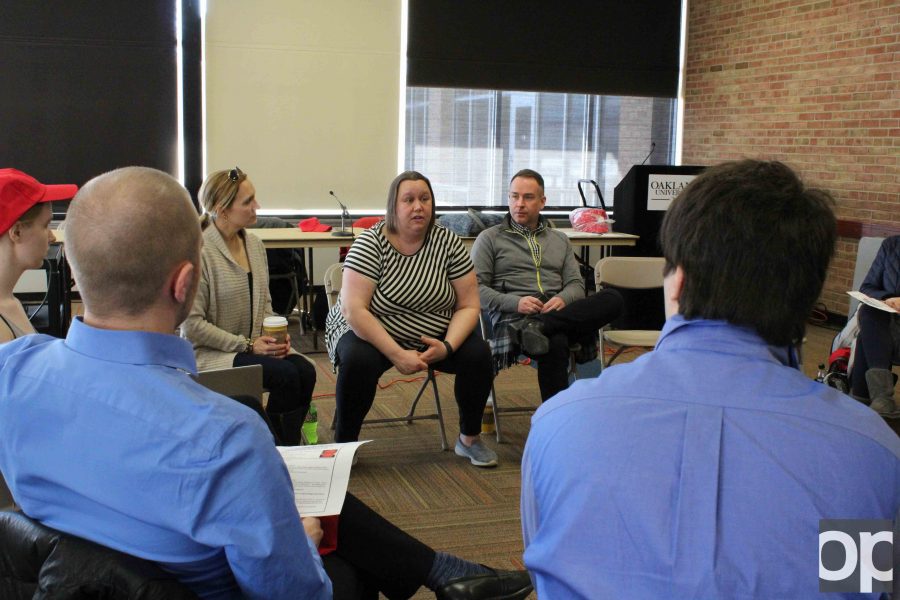Title IX panel discusses OU’s sexual violence and lack of survivor help
(From left to right) Professors Amanda Burgess-Proctor, Michele Purdie and Scott Pickett talk about Title IX and combating sexual assault on campus.
Professors called for a safe place for survivors of sexual assault and harassment at a lecture on Title IX and how it impacts everyone.
The discussion took place from 12-1 p.m. on Wednesday, March 15 in the Oakland Center’s Fireside Lounge.
The discussion was led by Associate Professor of Criminal Justice Amanda Burgess-Proctor, Associate Professor of Psychology Michele Parkhill Purdie and Associate Professor of Psychology Scott Pickett.
According to the U.S. Department of Education, Title IX of the Education Amendments of 1972 states, “No person in the United States shall, on the basis of sex, be excluded from participation in, be denied the benefits of, or be subjected to discrimination under any education program or activity receiving Federal financial assistance.”
While this covers a broad scope of discrimination, this lecture honed in on sexual violence and harassment. Under Title IX, federally funded universities are required to both address these issues and handle them, or risk losing their funding.
Purdie reported that 36 percent of the women in last year’s incoming freshman class who agreed to a survey had experienced sexual violence since their 14 birthdays.
The professors attempted to drive home the idea that Oakland University is in need of an office specifically designated as a place for victimized students to get a more comfortable form of help.
“We have a veteran’s office for individuals who have been in the military in some way,” Purdie said. “Do we have some sort of victim’s service office for people who have experienced some sort of violent victimization?”
The Office of the Dean of Students and OU Police Department are where students are currently advised to bring reports of sexual violence or harassment, but the speakers stated that students may not feel comfortable bringing such sensitive issues to these places.
They favor the idea of an office where survivors could receive entirely confidential advice. Resources would tell them what to expect if they bring a report to the OUPD or dean of students, among other things.
“There could be a place that would both serve crisis intervention needs as well as educational programming needs,” Burgess-Proctor said. “It wouldn’t take a lot, we joke. We’d literally need a room with a door, a small sofa, a box of tissues and a desk.”
The presenters stressed that this change will never occur unless OU students show administration that this is what they want.
Suggested ways to go about this pursuit would be to contact Student Congress or speak to state legislators during OU Day at the Capitol on Wednesday, March 29.
Students could also start a new student organization, which takes just four students and a faculty adviser, based on Title IX. Through this, they could receive funding to spread the word.
Short-term solutions were proposed until something more permanent such as a survivor’s service office can be implemented.
The speakers called for syllabus language to inform students that, if a professor is aware of sexual violence or harassment, the professor is obligated by law to report it. The speakers also hope that faculty can be educated on what to do if a student comes to them for support.
For more information on Title IX, visit knowyourix.org and atixa.org.




